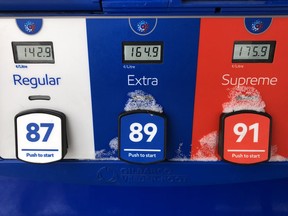Article content
CALGARY — Canadians heading out on the road for the July 1 long weekend are going to find filling up at the pumps much less shock-inducing than it was a year ago.

CALGARY — Canadians heading out on the road for the July 1 long weekend are going to find filling up at the pumps much less shock-inducing than it was a year ago.
Story continues below
The national average gasoline price hit an all-time high — surpassing $2.10 per litre — on June 12 of last year, as the fallout from Russia’s invasion of Ukraine disrupted global energy markets.
Prices had barely eased off by the time drivers were packing their vehicles for Canada Day camping trips and visits to the cottage. On June 28, 2022, the national average gasoline price topped $2.05 per litre, according to Natural Resources Canada data.
Heading into this long weekend, however, prices at the pumps are nearly 22 per cent lower. Price-tracking website GasBuddy.com pegged the national retail average price for gasoline at $1.59 per litre on Wednesday — with B.C. residents paying the highest prices and Alberta residents paying the lowest.
Story continues below
“Prices have eased since the first half of last year for a variety of reasons including the fading (but not disappearance) of concerns regarding supply disruptions due to the Russian invasion of Ukraine and slower global economic growth,” ATB Financial wrote in an emailed newsletter on Wednesday.
The West Texas Intermediate (WTI) crude oil price benchmark is currently on track to average right around US$70 per barrel in June, which is close to where prices stood two years ago prior to the Ukraine war.
The average WTI price for the first six months of 2023 is on track to be around US$75 per barrel, down from over $100 per barrel over the same period in 2022, ATB Financial wrote.
Current crude oil prices remain above the five-year average of approximately US$53 per barrel, but the year-over-year decline has brought some relief to cash-strapped Canadians.
Story continues below
According to TD Economics, lower fuel prices at the pump was the number one factor behind consumer price inflation cooling to 3.4 per cent in May, the slowest pace of inflation Canada has seen in nearly two years.
But it’s unclear how long lower gasoline prices can last. Vijay Muralidharan, energy analyst and managing director with R Cube Consulting Inc., said he expects prices will go up throughout the summer as refiners and suppliers begin to pass along costs related to the new federal Clean Fuel Standard, which comes into effect July 1.
Though refiners have an entire year to become compliant with the new rules, which are intended to put a limit on the carbon intensity of fuels sold in Canada, Muralidharan said he believes consumers will feel the effects sooner rather than later.
Story continues below
While the Clean Fuel Standard is not a consumer tax, it will require companies that produce or import fuel to gradually reduce the emissions intensity of that process by 15 per cent compared to 2016 levels by 2030.
Companies can accomplish that by blending in a higher percentage of ethanol or biofuels to their gasoline, by reducing their refinery’s emissions through carbon capture and storage or some other technology, or by buying credits from other companies that have a lower emissions profile.
“It’s not going to be an easy task. And that cost is going to be passed on to the consumer eventually,” Muralidharan said, adding he believes the impact of the Clean Fuel Standard will offset any decrease in prices that could result from a potential slowdown in the global economy.
“I think there’ll be at least, minimum, a three to four cents per litre (increase this summer). Unless something catastrophic happens in the market, you will see an increase in gas and diesel prices.”
The federal government’s own estimates are that the Clean Fuel Standard regulations will increase the price of gasoline by up to 17 cents per litre in 2030.
This report by The Canadian Press was first published June 28, 2023.
Comments
Postmedia is committed to maintaining a lively but civil forum for discussion and encourage all readers to share their views on our articles. Comments may take up to an hour for moderation before appearing on the site. We ask you to keep your comments relevant and respectful. We have enabled email notifications—you will now receive an email if you receive a reply to your comment, there is an update to a comment thread you follow or if a user you follow comments. Visit our Community Guidelines for more information and details on how to adjust your email settings.
Join the Conversation